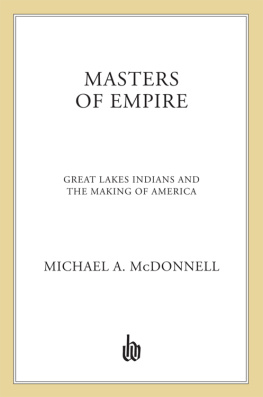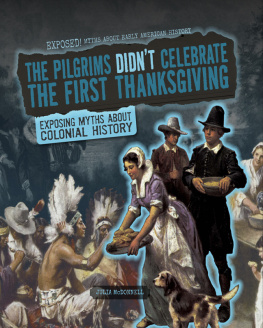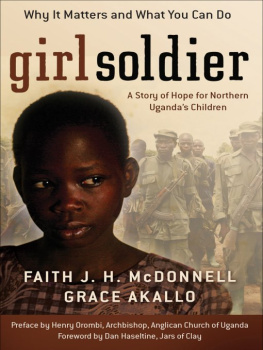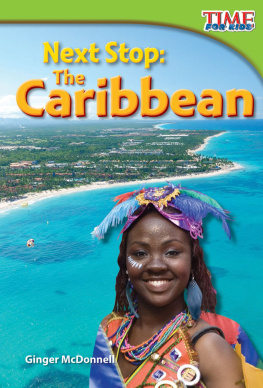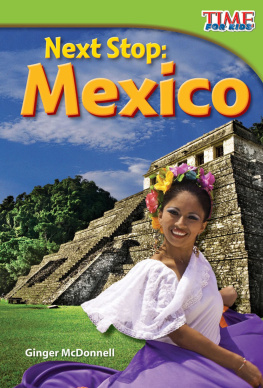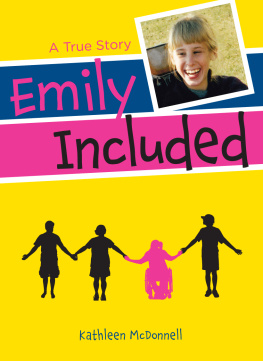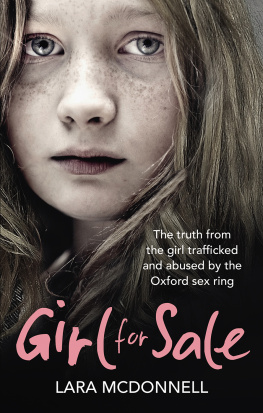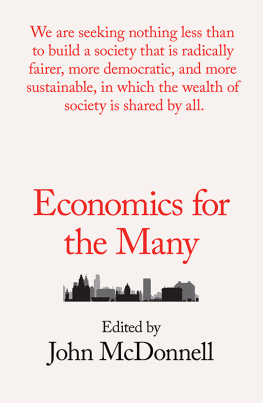Michael A. McDonnell is an associate professor of history at the University of Sydney. He is the author of The Politics of War: Race, Class, and Conflict in Revolutionary Virginia , winner of the 2008 New South Wales Premiers History Award, and coeditor of Remembering the Revolution: Memory, History, and Nation Making from Independence to the Civil War . He lives in Sydney, Australia. You can sign up for email updates here.
I started this book in old South Wales, finished it in New South Wales, and researched and wrote substantial portions of it in South Africa, Canada, and the United States. Ive left a sprawling trail of debts and I fear in enumerating them that Ill miss someone. If that includes you, please forgive me in advance.
For generous and vital financial assistance and support while I was researching and writing this book, I thank the University of Sydney and the Australian Research Council. Librarians and archivists across the world have also been generous in sharing their expertise and time, including Rena McGrogan, Anthony Green, and Nicholas Keyzer at the University of Sydney; Katherine A. Ludwig at the David Library of the American Revolution; and various staff at the British Library and National Archives in the UK, the Library and Archives of Canada, the John P. Robarts Library at the University of Toronto, the Wisconsin Historical Society, the Newberry Library, the Clements Library, and Mackinac State Historic Parks. Grateful thanks go also to Briony Neilson for her research assistance and her help in translating French sources, and to Ellen R. White for her work on the maps at the front of the book. Also to Shane Langlade for generously sharing his carefully reconstructed family genealogy with me. I especially thank Eric Hemenway of the Little Traverse Bay Bands of Odawa for welcoming me to Anishinaabewaki and sharing his time and knowledge of Charles Langlade and the history and geography of Waganawkezee. His insights were invaluable.
Many colleagues and students here in Australia have enriched various parts of this work, but for their specific comments and suggestions on earlier drafts or more recent chapters, my thanks to Robert Aldrich, Alison Bashford, Leigh Boucher, Trevor Burnard, David Cahill, Michaela Cameron, Ann Curthoys, Desley Deacon, Andrew Fitzmaurice, Kirsty Flannery, Lisa Ford, Kate Fullagar, David Goodman, Chris Hilliard, Miranda Johnson, Marilyn Lake, Steph Mawson, Cindy McCreery, Mark McKenna, Donna Merwick, Dirk Moses, Alan Rome, Carolyn Strange, Blanca Tovias, Ian Tyrrell, Ben Vine, and Angela Woollacott. While they havent had to read portions of this work, the extraordinary history students and teachers of the Sydney and NSW high schools our department has worked with over the past few years have inspired me to keep going. These include Chifley College, Granville Boys, Kogarah, Malek Fahd, Miller Technology, Trinity Catholic College, Auburn, and Sir Joseph Banks in Sydney, Coonabarabran, and Willyama in Broken Hill.
In Canada, the United States, and the UK, Ive presented various drafts-in-progress over the years, and for their comments, suggestions, and valuable conversations I would like to thank in particular Fred Anderson, Heidi Bohaker, Drew Cayton, Gregory Dowd, Kathleen DuVal, R. David Edmunds, Adriana Greci Green, Dallett Hemphill, Eric Hinderaker, Ron Hoffman, Forrest Hylton, Jacob Lee, Karen Marrero, Elspeth Martini, Gary Nash, Simon Newman, Jon Parmenter, Joshua Piker, David L. Preston, Joshua L. Reid, Nancy L. Rhoden, Daniel Richter, Brett Rushforth, Susan Sleeper-Smith, Jennifer Spear, Jason Sprague, Ian K. Steele, Scott Manning Stevens, Andrew Sturtevant, Alan Taylor, Sinclair Thomson, Coll Thrush, and Peter Way. More recently, Colin G. Calloway, Keith Widder, Melissah Pawlikowski, and Woody Holton all read the entire manuscript and offered suggestions that improved the book and likely saved me from a few embarrassments. So too did my editors at FSG, starting with Thomas LeBien, who encouraged and supported the project from the outset. Subsequently Dan Gerstle, and more recently Alex Starr and Laird Gallagher, have worked closely on the manuscript. Laird in particular has been a saintly figure for his patience, but especially for his timely and astute interventions and advice.
Colin Calloway, Kate Fullagar, Woody Holton, and Keith Widder are among those who have not just shared their work and made important suggestions but have also provided much-needed encouragement and support at critical moments. They have also endured a great deal of whining. So too have Barbara Caine, Frances Clarke, Clare Corbould, Hannah Forsyth, Marjoleine Kars, Gabrielle Kemmis, Elliot McGarva, Cam Mackellar, Maggie Mackellar, Iain McCalman, Kirsten McKenzie, Sally Mason, Sarah Paul, Ray Raphael, Marcus Rediker, Penny Russell, Glenda Sluga, Richard Waterhouse, and Shane White. The late, great Rhys Isaac also cast a long shadow over this book. We initially bonded over lost brothers and revolutionary acts. He was the first to welcome my wife and me to Australia, and our daughter to the world. Even while he was dying, he insisted on reading my work and urged me onward with the infectious enthusiasm for which he will always be remembered.
Rhys and Colleen Isaac were also always ready to provide a home away from home on my travels, for which I am grateful. So, too, were Ray and Marie Raphael in San Francisco; Anne, Bill, and Leela Ehrhart in Philadelphia; Clare Corbould, Dugald Jellie and Alastair and Marcus in Melbourne; and Sue and Norm Loomer in Ripon, Wisconsin. And I am especially thankful for the room made for my writing (literally and figuratively) by my immediate and extended family, including Mel, Jim, Molly, and Paddy in London; Karen, Herb, David, and Emma in Christchurch, New Zealand; Flo, Jacoby, Darren, and Huey in Kimberley, South Africa; and Jody and Ali in Toronto. My mum, Pam, as well has been extraordinarily patient with me over the long life of this project and has always kept the door openwhether it was in Caledon, Ontario, or now just down the road here in Sydneywith hot coffee, warm meals, and free babysitting always on offer.
My daughter and son, Carys and Rohan, have been less patient, thankfully. They have always been quick to climb across the keyboard and spill milk on my books. And as they have grown they have reminded me that surfing, camping, and just playing can be as much fun as reading and writing. My wife, Frances, will steadfastly deny she has had anything at all to do with this book. But she has been with me from the start of this project and brought much-needed perspective on it, along with a great deal of joy outside of it. Shes also been a rock through some very trying times for both of our families. It is impossible to imagine this book, and my life, without her.
Most recently, within the life span of our five-year-old son, weve lost Francess dad, mum, and brother, Robbie. All three, along with Robbies wife, Marian, and their two daughters, Roxanne and Kayla, warmly welcomed us on our many visits to Kimberley, South Africa, and went out of their way to find me a quiet and comfortable place to read and write during our extended stays. They also politely refrained from asking why the book was taking so long, and made sure there was tea and biscuits by day and brandy and Coke by night. It is difficult to measure their contribution to this work, and their influence over all our lives. This book is dedicated to them. They will always have a place in my heart.
ALSO BY MICHAEL A. M c DONNELL
The Politics of War: Race, Class, and Conflict in Revolutionary Virginia
Standing on the shores of the straits of Michilimackinac or atop the bluffs of Mackinac Island, it is easy to understand why many believed this region to be the birthplace and center of the world. The teeming blue waters of Lakes Huron and Michigan bending away from the narrows both east and westward give an impression that one is standing on a peak of sorts, at the top of the world. Knowledge of where those waters lead only reinforces the idea that Michilimackinac is central. A vast interconnected system of waterways could take a savvy paddler just about anywhere on the continent and beyond. From here, one could travel southwest to Green Bay, St. Josephs, or Chicago. Short and manageable portages would take you to either the Wisconsin or Illinois River, which in turn empty into the Mississippi. From there, the rest of the continent east of the Rocky Mountains along with the Gulf of Mexico are accessible. Likewise, traveling north from Michilimackinac would take you through Sault Ste. Marie into Lake Superior. From there, the many rivers and lakes that drain into Lake Superior also give access to the north country and even Hudsons Bay. Finally, south and east of Michilimackinac lie Lakes Huron, Erie, and Ontario and Georgian Bay. Skilled canoeists could take one of many routes across these lakes and quickly find themselves heading down the mighty St. Lawrence River toward the open seas of the Atlantic Ocean. From Michilimackinac, anything is possible.
Next page
